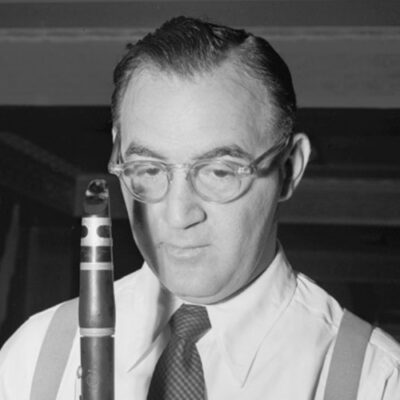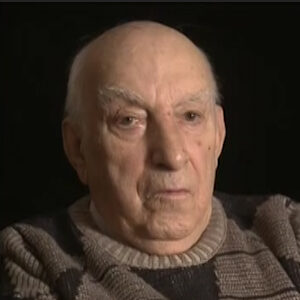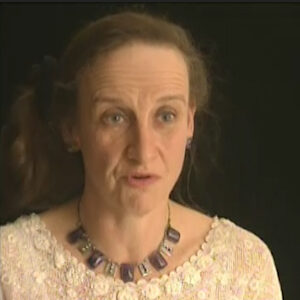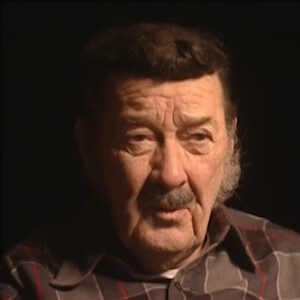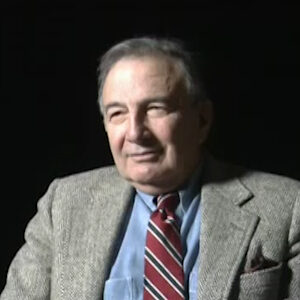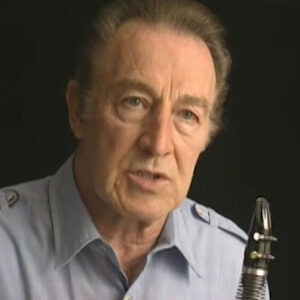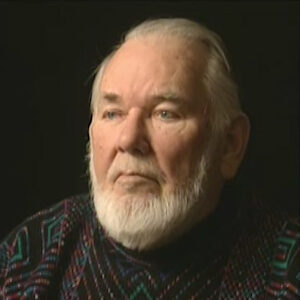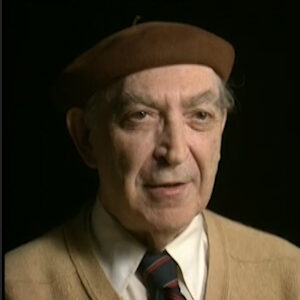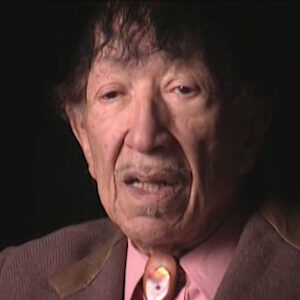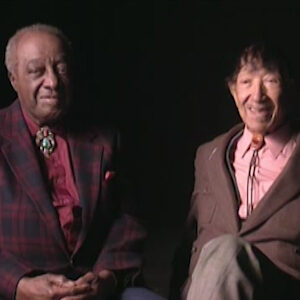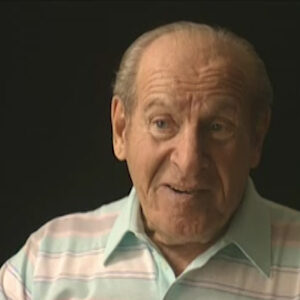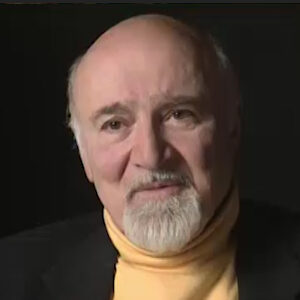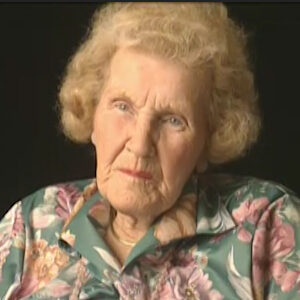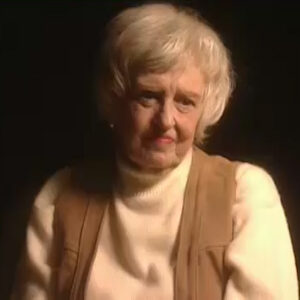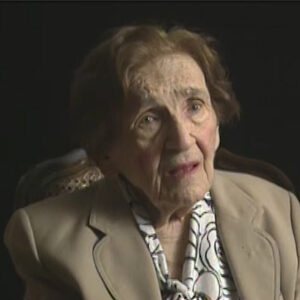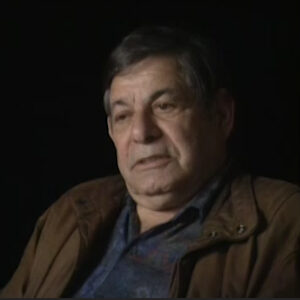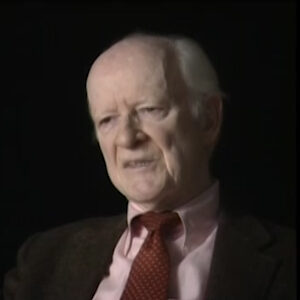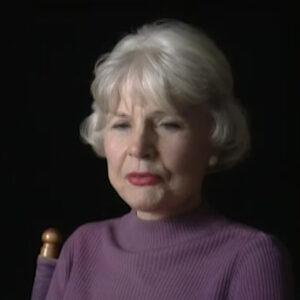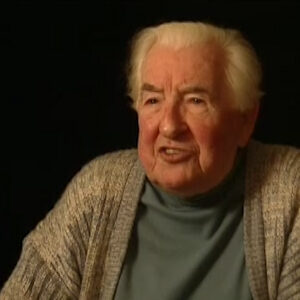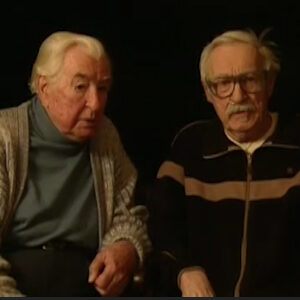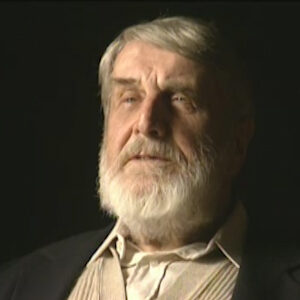Speaker There was a small group of jazz fans in Havana, and we used to follow Charlie Parker, Dizzy Gillespie in the early 40s. In fact, in November 1940, when I first heard Dizzy Gillespie has been, I didn’t know what to make of it. It was so wild. It was so exciting that I got taken in by the music immediately. So that’s how I first became aware of bebop of that time. I have been familiar with the big bands because I come to Riverside Military Academy here in the United States, give them a high school from 1936 and 1940. And in those days, you know, the big bands used to broadcast live from whatever they were playing. I just listened to Artie Shaw, Tommy Dorsey, Benny Goodman and whatever. And by this time I was I learned to play trumpet and I joined a dance band in the school because I wanted to really get into this music. Also, it gave me an advantage if I were bugel in charge and the people on duty, I didn’t have to do breakfast with the rest of the cadets. I could do it whenever I wanted. I could do whatever I want. I think that’s how I learned to play out of it. And that’s when I became aware of big bands in jazz. And then in 1940, I went back to Cuba and I said there was a small group of jazz fans that we got together once a week. Last week we had jam sessions and we first one of them came to New York, as a matter of fact, and he brought some records with him and Ben and the first Dizzy Gillespie big band records. I remember with wish things to come. That was incredible. I just flip up other music from then on. That’s just what I wanted to write a play.
Speaker Did you hear Benny Goodman on the radio in Cuba, too?
Speaker I know it was very difficult in Cuba to hear broadcasts from United States because of the distance. You know, we didn’t have the facilities to hear Raul Castro, you know, but I used to listen to the band Engelmann Ban on ragers. And I remember specifically the band. I had a sort of a bill fitting in that ranges to me that was incredible. And the arrangements were not to be believed. So in that sense, you know, I was I mean, it was Ben as Ben remember, Benny rides again.
Speaker Was that one of the aluminium bands raised again? Yeah. My question is start again.
Speaker I remember Benny rides again. And right now, my members gave them some of the things that the band played that were so impressive. But I remember that. I remember in general, the band has been so advanced that I was you know, I was really mesmerized by it.
Speaker This is true.
Speaker When the clippings they get together, we’ve talked about, Benny, you heard later that Benny said what a cute a Cuban Jaziri well know this game.
Speaker All right. In 1948, I came to New York to seek fame and fortune like everybody else. And I was working as a ghost arranger. It’s somebody else’s music, house, music, golf. What do you got at the time? And Stan Hassock, I used to be a protege of Buddy has a girl. And I began being friendly. And he started to to have some respect for my writing. To really like it. And because he’s here, some of the things that I wrote for the band, like I used to write this natural the orchestra in Las Vegas, 60 embraces 60 miles of what you know. Well, it goes right. It does. Stan said, you know, Chico Bennett’s book form and is Bob and this big band that he wants to get into today’s, you know, thing. And then Stan told me later on, his reaction was what a Cuban jazz arranger who was supposed to write jazz. He was always Apple’s Roomba and, you know, like so we’ll go get another cat. So that was his reaction.
Speaker And then how did it happen with the one thing in particular that got you started?
Speaker Well, then what happened is that many ask Stendahl. He didn’t know my name. I told him to write something I something that came up and I remember that. I said, look, I was trembling with fear that this isn’t going to like this, but I want to write a real love thing the way I said and I wrote something that I call on the blues. So I remember that has hasn’t got to go to rehearsal. There are a lot of rehearsal stars. We have some very sad Brinsmead. He liked it. Well, I hear that wonderful news. Thank God with Jeggle. Then I want you to go way. He loves it. You know, it was really one of the best days of my life.
Speaker And then he started a regular relationship.
Speaker Well, he asked me to write some more things. He asked me to write. I don’t remember exactly the sequence of events. He asked me to write some arranging. I would need to be done for vocals. He and some other things there. And I don’t remember exactly when. At some point he asked me to be the staff arranger for the band. He was signed into a contract and he’s proposed a very good salary, which I liked because, of course, why? What is I have got at the time. So I thought, yes, this thing this is great. And it was awesome. Tom’s a very curious buddy. Grecco was the vocalist vocalist at the band at the time. So Benny asked me. I guess he was thinking of having one person, one musician perform double duties. You play piano. Oh, by the way. I wasn’t sure what time it was after all, Faryal. But due to the rehearsals, Betty was called. I had to could pronounce the name. So eventually, you know, people used to be known as shingles. No. Hey, chicle. And that was a chicken stock. I never got it anyway. So Benny told me. Shinkle. Would you mind playing piano? I understand you play some piano. Yes, of course you do. I wanted to go with the master. Yeah, sure. I play piano and outrageous piano, you know. You know what? Richard Gere is very bad. Yeah. So anyway, Benny said, look, we might start with abandonment and rage. And, you know, when I’m I playing piano, one body recalls things. Sure. Sure. I play piano and shake it. I don’t play no piano, just outrageous piano. So I was a man, you know, start playing piano when everybody went on in you to make a the thing. I sing it again. You know, I think eventually Benny on I say Heagle. It’s what I think to train my range. I don’t think it’s something you want to be blamed anymore.
Speaker Scuse me.
Speaker What do you think that thing was with you? You think he really got into it musically?
Speaker He tried very hard. He did try very hard to get into Bubb. But somehow I felt that it was, say, a language is alien to his musical thinking in the harmonies were more involved. You know, you had all these intricate harmonies that that he was used improvising with. So the end result was that all the guys in the band that were solos that were very conversant with bebop music and they used to pay their solos and they used to know what to do was with him, with his solo. But Benny somehow would try to revert back to his old style, which I’m not. I’m not, of course, to Jason, because he’s the one unique personality. And so I think in that sense, he wasn’t very comfortable, was the bebop man. And I think the the. The the the. He he wasn’t really conversant. He was not really conversant with the idiom in the sense that he was he tried very hard, but somehow was it was none of his nature. Also LeMans. Let me say something. I was at the time, but was the end of my tenure was Benny. I was very much taken in by Stan Kenton Orchestra. And it’s taking those that was beginning to have these innovations in modern jazz voice and all that. So, you know, and I was so taken with their band that I was beginning to write a little bit more than Benny really wanted. I was I wasn’t following the style of the band. And indicative of that was that one time he asked me to write it in a ranking of Good Night, Sweetheart. And I wrote in our region that I now recognize I was too far out and noticed I was the man who started Shickel. Are you gonna do yours? How many lessons? But that was that was really symptomatic and symbolic of the fact that I was deviating from the band’s style. And I should have never done that. Let’s face it, if you’re going to write for Benny Goodman, you should write banning ominous go Mr. Reagan style. Thank you, Mr. Wade. So in that sense, Benny never, never comes out. But that says Benny never really real, really felt comfortable with bebop music.
Speaker You think he did it because he wanted to be with it? He wanted to try to because I mean, it was hard for Big Man. Can tell what the atmosphere was not like. It was in the 30s, for sure.
Speaker No, but I think by show partially was because it would seem that the music was aimed to be way commercial. And naturally, Benny wanted to be also commercially successful in a commercial sense. So that’s why he tried to embrace it, bebopper style. And those days, you know, this had his being. He does man take on it. So that’s simply and this is the wave of the future. This is going to be the success of the future. So I think that was partially a yes for that.
Speaker I guess you told Al it’s true that one day you called Muriel Zuckerman and she told you Benny.
Speaker You know, I mean, I know we’ve heard he said. Did he made too much this year? We think I lonely. Know. That is true. But it is a way out.
Speaker No, I heard that the band was breaking up and I called Murielle and I said you was going on. Was this why the band breaking up has been so successful? It was shingle for tax purposes. Benny has never really made too much money this year. So say, is that a good reason to break up a band? What about my little living? But there was I was three years.
Speaker Can you tell me anything about your own? Because legacy was quite a character.
Speaker She was quite Mireia was quite a character. In fact, she was very helpful to me because, look, in 1947 when I came to New York, I was completely, completely disoriented after the way of life here. Muriel, you know, gave me some very good advice regarding. All right. Think of my taxes. Little bits and things that she told me that were very helpful in my life to get myself organized. Yes.
Speaker Did you see her with Bennetta? You know, I a sense of how they interacted. She said she worship him.
Speaker She thought that Bernie was really the end, all of everything. And I think that’s the way it should have been. She was a very loyal employee and Bernie liked him very much because she took care of all the things that, you know, that she should like Ben is going to want to get involved to many of these days. So she took the stairs and he was very grateful for that. Yes.
Speaker I look good again. Doing what you want, it does.
Speaker Another another personal aspect, I understand, is. You have to take out his daughter. I tell you things about marriage, what you did.
Speaker Yeah, well. Bernie was, in a way, when we got the Hollywood Palladium, which the band, I think, spent about quite some time in Los Angeles. And if I remember correctly speaking, it’s been 45 years. How can you remember all sorts of money these days? He was very nice to me. It was almost like like frank, personal, some personal affection they felt for me. He asked me to his house to to have dinner. And of course, I got one. To get to this mansion, which is, you know. Wow. That’s great. What am I supposed to know? So anyway, they were there. His wife, Lady Hammil, was sitting there and his daughters at Franglais got inside of you when you got a letter. Frank, how many daughters yet? But anyway, I went out and he asked me at one point, would you like to think? I think it was racial. Out to dinner or something. Maybe he was worried that she was bored. Assumptions, I guess. So he prevailed on me to take her out. Of course, I was so jiah and know what to say. You sure know. You know, so. So we did go out. And of course, nothing improper or nothing. And all I can say is one is that I hope that she enjoyed as much as I enjoyed.
Speaker There is also a story that he introduced you to Stravinsky that he knew about your interest in modern music and anything you can say about his interest in classical music. Is that something you shared that made you close to?
Speaker Well, Benny Neal, because I had talked to him many times, I wanted Stravinsky, and at a time when we were in Los Angeles, I think he was interested in having a Stravinsky write something with a sextet. To one day he’s gonna system. Is it. Be one of those is that I mean, give me what I want to say is. Of course. So he took me to 2000 and it was. But I think it was very much in touch with classical music. I understand that if he wanted to commission or want to Minsky, that means that he wasn’t interested in music and also the fact that he played concert music with certain dexterity, which you’re one of the best Lannett players in the world, you know.
Speaker Yeah, know. Hearing the piano.
Speaker Yeah, right.
Speaker You remember his interaction with Vince? I guess you told me that you talked to Stravinsky about arranging for drums.
Speaker Well, I was so I was so thrilled to be that was the Stravinsky that I don’t remember much, except I kept looking to escalate. My God, he must have been embarrassing. It so happened that I hear of. It was very risky because they before I had gone to cause of the Los Angeles Philharmonic and they had play a Millo Symphony. So I told Mr. Stravinsky I heard a Milos infinite blast at that signing ceremony. And he asked me, why do you think of it? Have measure been. I’m going to gamble with this. Frankly, I didn’t like it. He gave me. He gave me a whole lecture. Yes. A symphony is a very serious form of music that should be approached, you know, different manner than Mr. Miller did. I guess I hit it off. I said the right thing. So anyway, so when I sit in there and they talked about, you know, the possible future commission, they want us to do it for free. And establishes that they started to ask me about a drum. Maybe you can tell me based on another drum appraisal, which is very fruitless. And if I had it here, I wanted it. So I started trying to draft Mr. West. Now, why do I. So it was very interesting that he was where, you know, he wanted to know everything about it. He just thought he was going to write for us. He was not a jazz musician. So that means that in terms of how thorough he was in investigating his possible, you know, instrumentation orchestration, that he had this very thing that Benny brought you with the arranged for the band, that he knew that there would be a, I think, Ben in Benny to sending his stand. Knew that at the time. I mean, he was my love of classical music. So I thought he probably figured it would be a good thing to think it was me. It was real for him. And and maybe I’m a splendid drums, Mr.. Oh, this is a very, very interesting thing. While I was there, that was a story this hour, Veera. His wave. They wanted to, you know, to be nice to me. Is it known that I was cute when they said. Would you like a drink? Oh, yes, sure. Sure. So he’d come they come out with a bottle. Bacardi what else. Right. So I said, yeah, well like a scotch and soda.
Speaker Did did you get a sense at all that many during these years when you read about these now, there’s really a sense that he.
Speaker In the late forties was in some kind of a decline that he was. The music was going out of fashion and it it really he was going right out until like 1950, I guess, when the records of Carnegie Hall came out and suddenly he got a lift again. He was going out of popularity, that the polls were not going to get any sense of that being around him and how he took that. He worried that he was maybe losing fans or success.
Speaker I think one of the reasons he organized the so called B book, Ben. Was because he wanted to be up to date and not disappear. You know, in terms of having a big band that was successful commercial terms. And so I I must say that in my opinion, he organized it bit by band. Mostly, I think of the major reasons he felt that, yes, he was that this new music was so powerful and it was so becoming so popular. Yes. Circus as opposed to popular circus. We must know it was always keep in mind that jazz is a specific segment of the market that’s completely different from the big pop market. Even in those days. So I think he in that sense, he wanted to keep his popularity going. He knew that the old style of Ben. Oh, now what? The old all his you know, he was. And now when I was a great, big, great. But in those days, the old star was going out. What’s going now? The old band. And we would just play those Frege’s arrangements. That was not happening anymore. In fact, he asked me at one point to write an arrangement of stopping it in some way, which I did. He asked me to pop it up, which I know. And of course, it didn’t work. But the stubborn as I was to stop it at the Savoy. I mean, what was something else? But anyway, I think he was really worried that his popularity was waning and he needed a shot in the arm to put it in there.
Speaker Did you ever talk to you about Charlie Parker or did you or did he ever talk to you about the connection?
Speaker Well. I’m rolling on the transcript. Yeah. Okay, um, anything about that bird or did he ever hear more of that Charlie Christian?
Speaker I don’t think Bernie was very aware of this. I never heard him make any kind of commentaries regarding better DC or the. When you were called to be Bob, you know, group of people that were released and I was a Musea, in fact, I never heard him make any comments or other musicians. In that sense, he was pretty much into himself, into what he was doing, and that’s it. How about the Baret story and establish that he would even get into this thing wearing a beret or that he may have loved to Symbol’s mannerisms just as a joke, but I don’t think he was really sincere about that. And only when he would remember somebody recalls that Bereng or anything like that.
Speaker Excuse me. How about being on the road with them? That’s something we’ll follow. From the earliest bands. Thirty five. You know what that was like? Just thought about Benny, just in general, about the experience of being in a big band traveling across America.
Speaker Well, look, I had never been in United States except, you know, some elementary school in for four years. Then I came to New York and I had never thought I was the van on the road. I had no idea of comparing notes with anybody else or what the what what it was like. I remember that we went through Peoria and I did like it. And then we went to Salt Lake and all that was done. We came out with way to Los Angeles, to the Palladium. And in general, frankly, frankly, I didn’t enjoy the experience of being on the road. What was it like, long hours of traveling in those days. And you can say, well, we’re gonna take a plane now that it wasn’t it was by bus one after the next. You never knew what the hotel would be like, you know, and what kind of food you gonna find? You know, so it was very inexpensive. That says and in general, I did not enjoy what we were doing or saying, oh, my God, we’re gonna be here for some time now. Punggye.
Speaker How about racial issues? Something’s been brought up with Bernie because he was his family reintegrate. And I guess when you’re talking with Ali, you mentioned it probably would agree it had in Syracuse or something.
Speaker I want time. Yes, there was a problem. I think I was and I wasn’t really there. I wasn’t a witness to what happened, something that may weren’t there very, very, very happy. And I heard the stories of some of the guys in the band. I was in there, but I had the story that where they got very angry and he was standing there with burning. Syracuse, I think I went just in front of Benny X rated come out. So I did. But I think where they had been drinking because where there was a very gentle person, really.
Speaker Oh, I thought it was I misunderstood. I thought reading the notes that something had happened racially against him. And then you’ve got talking.
Speaker I think know, if I remember correctly, why they have blame Benny incorrectly for some kind of racial slurs. Some say something racial. How do you say insensitive with that’s part of the hotel maybe. I mean, that’s a.. I think what they’ll do, you know, maybe he had been drinking. I hate blame Benny. It’s I think it’s an accident. It’s an incident that doesn’t mean anything, because Benny was, in a way, a very gentle president in that Sansing fight. We’ll see that he integrated the first one of the first bandleader’s to integrate groups and bands, you know, and why there was it was a very, very sensitive soul. He was a very nice person. And I don’t think he was really mean.
Speaker I think that most most I think mostly alcohol was it was the culprit in really any other stories about Benny in terms of, you know, his personality or his sense of humor or the famous anecdotes about the Ray roamers or, you know.
Speaker Yeah. Yeah. Well. Well, I don’t know what the story is through it. I heard it from some of the guys in the band that he was an old Asian and a drummer. I was there, sit and play in Atlanta and all that live is soft. Pops, pops soft. But it’s just soft, softer puffs. But I’m not playing. But yeah, you’re fired. I don’t think Benny was that insensitive. I think he had a there was more more talk about it than really. I know. I know for a fact that at one point do the people band he became angry at, the vocalese was, wasn’t those a Terry soap? And he had a habit of of of bothering her when she in stay sing in my comment, I was about to leave her, which is very annoying, you know, for a vocalist. But I know that, Benny, what it does about and you can say that was almost a war. Is that here with anyone really? I never saw him. I don’t think he was a very warm person in that sense with Simon. No, he wasn’t a warm person, but he was not as sensitive to the needs. No, he wasn’t.
Speaker I’ll get his famous thing with. I’m looking for a good read. Did you ever notice that?
Speaker No. Know? Yes. So we finally got rid of the perfectly. Oh. Then all local and it plays as a form plays. I do the same thing all the time, you know.
Speaker So I have no, you know, any, any other anecdotes, things that, you know, either capture him or.
Speaker Well, the other musicians that are I saw him again in nineteen seventies. He was recording for he wasn’t a record for I think it was Gamon label was Boivin producing. And. For somebody to roll the bull run, don’t do to harm me. Was the sixth embryo recording here to me as an arranger. And I went to see him until he has an iPod. He had an approval, 66 feet, I think it was. And it was like all down to about this time. Of course, you know, Barney, let’s see if I used to call in Mr. Gouldman. No way. When I first started working with him and it was like so many others, they was like Barney. And it was about to say it was like something. So I wrote for Ranch’s for that recording. And it was I think, remember, bought Billy Butterfield. Wasn’t that that’s Billy Butterfield. Who else was there? I remember. Anyway, Bernie was being his useful, you know, change this change that changed the other bolívar. There’s a. I’ll take that solo. You take this bill and forget about what’s written. So finally, look, I hate to say this is the last time I ever saw Bernie personally. And I was very, very angry that he was doing this because he wouldn’t even call me as a chick. What do you think would you do? He you know, I mean, Richard, I’ve been so angry. I went up the way round and there was a Bobby Bennett. You need an arranger, you that a cop is that’s all so familiar with. I know for sure I hate to say this. I was an uncle for reaction and I never saw him again.
Speaker It tells me you spoke you spoke about him a couple times, almost lapsed into the present tense, like it’s hard to think that he’s not there because it’s such a vivid presence here.
Speaker People have done well. Here’s one look. It’s one of the greatest. And one of the greatest musicians, one of the greats in a place in the history, I think, because his classic airplane was unique, was fearless. And I can embrace both types of music, jazz and classical and be so good at it must be in a very exceptional position.
Speaker Was it was it exciting for you when you hear him play?
Speaker Oh, sure, Benny Benny had a sound. It’s like, you know, like assertive musicians. Our blessed was a personality of precisely. The sound starts something that isn’t unique. Many had a very unique, unique personality. Yes.
Speaker Very vivid way.
Speaker OK. Here we go. Wait, did the.

